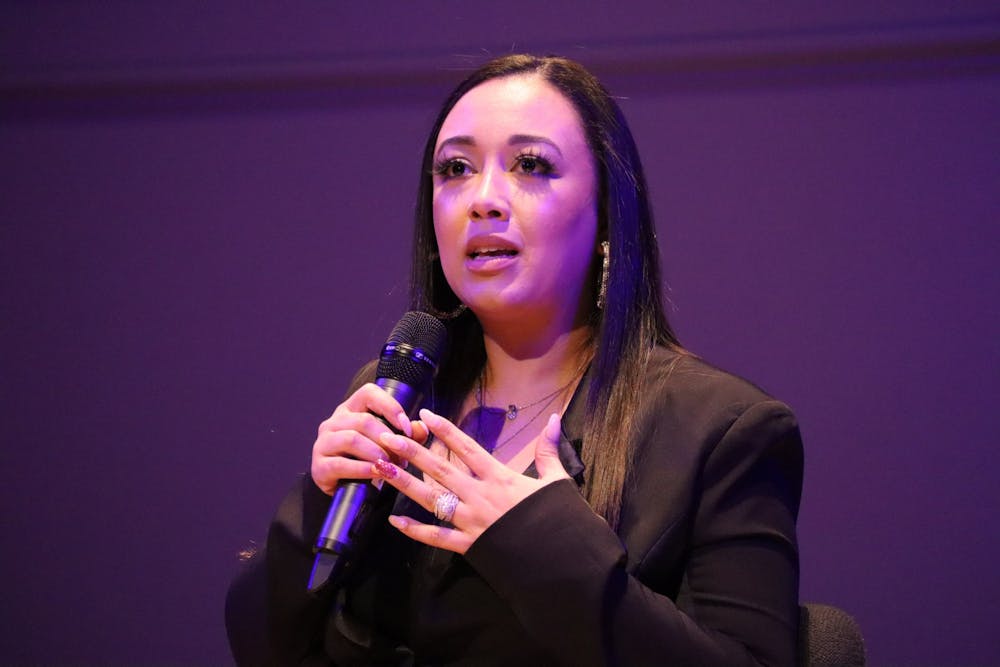The Black Student Alliance and University Programs Council sponsored “Free Cyntoia: A Story of Redemption,” Thursday night in Old Cabell Hall in honor of black history month. Author and motivational speaker Cyntoia Brown-Long spoke to a full audience about overcoming the adversities she faced as a victim of sexual violence.
Brown-Long came to public attention after she was sentenced to life in prison for killing the 43-year-old man who paid her to have sex with him when she was 16 years old. While in prison, Brown-Long earned her associate degree and bachelor degree from Lipscomb University, which she used to start a mentoring project that aimed to help other young women in her situation. In 2019, she was granted clemency and released from prison.
Brown-Long opened her talk with a personal recount of her religious childhood and family life in Tennessee. According to Brown-Long, she began to see herself differently on her first day of Kindergarten when a classmate asked her why she did not have dark skin like her parents, which Brown-Long then asked her mother.
“Each answer that she gave me left me feeling more confused than the last,” Brown-Long said. “She tried to reassure me that I was loved, and I was beautiful just the way that I was. But a small seed of doubt had taken root in my spirit, and I couldn't help but feel that I was out of place.”
After that, Brown-Long tried to accept she was different, but it seemed the school system had labeled her as a trouble-maker due to her race. At 12 years old, she was sent to alternative school and had her first experience in juvenile court shortly thereafter. She was then sent to a facility before being allowed back in public school on probation, but the public school still seemed to label her poorly. She was sent back to the facility that she ran away from at the age of 13.
“If I had to pinpoint exactly where things took a turn for the worst in my life, definitely the day I ran away,” Brown-Long said. “The three years that followed that decision were hands down the most traumatic, reckless times in my life.”
Those three years ended when Brown-Long killed the 43-year-old who bought her for sex. She was thrown into questioning without knowing or being told the importance of having an attorney present.
“Fourteen years ago at the age of 16, I was told that I would spend the rest of my life behind bars,” Brown-Long said. “But everything changed when I learned to put my faith in God. The physical prison I found myself in was just one of the holds keeping me captive. In order to truly be free, I would have to first find redemption while trapped in an unforgiving institution. It was a search that would take 15 long years to complete. By the grace of God I stand before you today.”
While in prison, Brown-Long’s case gained attention through the news and social media, shedding light on the injustices she and others similar to her experienced — especially among young people with social media platforms.
“I researched her for a seventh or eighth grade project, and her story brought me to tears,” said first-year College student Mackenzie Joseph. “Then, I really did not have faith that she was ever going to see the light of day. So that's why her standing at this podium tonight really did mean a lot because I lost faith in her, and I find it crazy how she didn't lose faith in herself and she's going through all these obstacles.”
In preparation for the event, BSA Executive Vice President Ciara Blackton, a fourth-year Commerce student, looked for a speaker that would encompass various aspects of the BSA community and larger University community. After deciding she wanted Brown-Long to speak, Blackton reached out to UPC Cultural Connections Director Emi Lockwood, a third-year College student.
“I think that for a lot of people Cyntoia just represents… so many interrelated struggles,” Blackton said. “For women who have been victims of sexual violence who have been in situations where they've been exploited, Cyntoia can speak to that. She can also speak to the African American community, which often disproportionately feels the effects of the criminal justice system, and she can also speak to those people who have through their faith been able to completely change their lives.”
When the posts and flyers about the event started circulating around Jan. 24, news of the event travelled quickly.
“At first I was so shocked,” said first-year College student Nyjae Martin. “I didn't know exactly… I saw the flyer and I saw what it said, but I was convinced there's no way she's coming to U.Va., to speak to us and we have the opportunity to just go. I just thought it was amazing.”
BSA and UPC spent months perfecting every aspect of the event, and Blackton acknowledges the one variable they could not control was the number of attendees. Less than fifteen minutes into the event, the bottom level of the hall was full, and staff members began directing people to the upper level of the auditorium.
“It warms my heart to see how [full] Old Cabell Hall was,” said first-year College student Zainab Jaffa. “I'm so happy that all these people took time out of their evenings to be there.”







